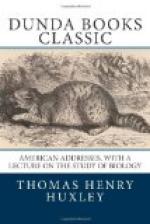Let it not be supposed that I am proposing to narrow medical education, or, as the cry is, to lower the standard of the profession. Depend upon it there is only one way of really ennobling any calling, and that is to make those who pursue it real masters of their craft, men who can truly do that which they profess to be able to do, and which they are credited with being able to do by the public. And there is no position so ignoble as that of the so-called “liberally-educated practitioner,” who, as Talleyrand said of his physician, “Knows everything, even a little physic;” who may be able to read Galen in the original; who knows all the plants, from the cedar of Lebanon to the hyssop upon the wall; but who finds himself, with the issues of life and death in his hands, ignorant, blundering, and bewildered, because of his ignorance of the essential and fundamental truths upon which practice must be based. Moreover, I venture to say, that any man who has seriously studied all the essential branches of medical knowledge; who has the needful acquaintance with the elements of physical science; who has been brought by medical jurisprudence into contact with law; whose study of insanity has taken him into the fields of psychology; has ipso facto received a liberal education.
Having lightened the medical curriculum by culling out of it everything which is unessential, we may next consider whether something may not be done to aid the medical student toward the acquirement of real knowledge by modifying the system of examination. In England, within my recollection, it was the practice to require of the medical student attendance on lectures upon the most diverse topics during three years; so that it often happened that he would have to listen, in the course of a day, to four or five lectures upon totally different subjects, in addition to the hours given to dissection and to hospital practice: and he was required to keep all the knowledge he could pick up, in this distracting fashion, at examination point, until, at the end of three years, he was set down to a table and questioned pell-mell upon all the different matters with which he had been striving to make acquaintance. A worse system and one more calculated to obstruct the acquisition of sound knowledge and to give full play to the “crammer” and the “grinder” could hardly have been devised by human ingenuity. Of late years great reforms have taken place. Examinations have been divided so as to diminish the number of subjects among which the attention has to be distributed. Practical examination has been largely introduced; but there still remains, even under the present system, too much of the old evil inseparable from the contemporaneous pursuit of a multiplicity of diverse studies.




